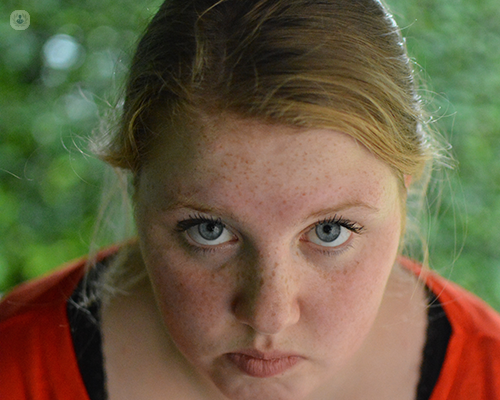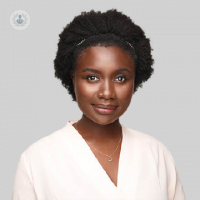Rosacea: your questions answered
Written by:A facial rash and visible blood vessels are the classic signs of rosacea, a skin condition that affects one in 10 people in the UK.
In this article, highly esteemed consultant dermatologist Dr Mary Sommerlad, provides a comprehensive overview of rosacea, explaining the different types of rosacea, ways to prevent a flare up of symptoms, and the important role of sun care protection.

What is rosacea? Is it an autoimmune disease?
Rosacea is a chronic skin condition that predominately infects the facial skin. It's not considered to be an auto immune disease; it's considered more to be an inflammatory condition. Its exact reason is unknown, but we know that there's definitely a relationship between sun, sun exposure and rosacea. Genetics plays a part as well.
It can affect anyone of any skin colour, but it's more apparent and people with whiter skin tones, because you can see redness of the skin and sometimes the spots of rosacea can appear redder.
Are there different types of rosacea? Do they range in severity or nature?
There are different types of rosacea. If you have one type of rosacea, you don’t necessarily go on to get another type of rosacea, but you can definitely get an overlap where different types of rosacea cross over with each other.
Of the commonest types of rosacea we see, the first is erythematotelangiectatic rosacea, which describes the appearance of blood vessels in the skin. This can also be associated with flushing of the skin, with the suddenly appearing very red usually unpredictably but sometimes with a known trigger. The telangiectatic part of the erythematotelangiectatic is seeing what appears to be “broken vessels”. These are visible and persistent vessels around the cheeks, sometimes on the nose as well.
The second type is papulopustular rosacea, which affects the central part of the face and looks like little spots or pimples that are usually all the same size. There are no associated blackheads, whiteheads or comedones, so that makes it different from acne. These spots don't leave scars, although they can be persistent for several weeks, and are also not associated with oilier skin types (whereas acne sometimes is associated with having oilier skin.)
The third type is ocular rosacea, which is rosacea mainly around your eyelids. It can give your eyes a very gritty sensation and the eyelids can look quite red, irritated or inflamed.
Finally, you can have phymatous rosacea. People often think of a red nose, but it can also affect the forehead and the cheeks, and this is a thickening of the skin.
Again, you don't have to get all types of rosacea but some can definitely coexist. Most people with rosacea will also describe a very sensitive skin, regardless of the type of rosacea they have, and as with anything in medicine, rosacea is usually a spectrum. You can have a very mild form of papulopustular rosacea which has little effect on the quality of your life or you can have a very severe form with many spots, papules and pustules nearly all the time which has a huge impact on your life. That goes the same with ocular rosacea or erythematotelangiectatic rosacea and granulomatous rosacea. There is always a spectrum.
What are the causes of rosacea? Are there ways that it can be managed by addressing these causes separately?
Interestingly, nobody is 100 per cent sure on what causes rosacea. There definitely are thoughts that believe it's something to do with how the sun interacts with blood vessels in our skin, making vessels a little bit leaky. This leakage of vessels can then trigger a chronic inflammation in the skin which look like little papules and pustules of rosacea - around the eyelids, it can look like the ocular form of rosacea. Eventually, if you keep getting lots of inflammation in the skin, the skin can thicken up and that can give you the final test or granulomatous form of rosacea.
There's also a thought that a particular mite that lives on our skin is also involved in rosacea, and that’s why sometimes there are some treatments that can help reduce mites. This mite lives on all of us, but people with rosacea are susceptible to it. Certain treatments can act as an anti-mite and an anti-inflammatory treatment, and that can help some types of rosacea.
The exact cause of rosacea is unknown, but we know that sometimes it can run in families and that for some people, rosacea can start at a much earlier age. The usual peak time for rosacea is somewhere between your thirties and sixties, although it can also affect people who are much younger than that.
How is rosacea treated?
Management of rosacea is very dependent on the type of rosacea you have and the symptoms you have with it. Depending on your type of rosacea, your dermatologist will tailor a treatment plan towards your type of rosacea and your lifestyle.
If you have the kind of rosacea where you're especially affected by flushing and what appears to be broken vessels on the skin, then we'll give advice on using skincare products that can mask a red face or reddening of the face. We can also sometimes recommend types of laser therapy that can help reduce the appearance of blood vessels in the skin.
If you have the rosacea where you get mainly a textural change, like bumps on the skin or papulopustular rosacea, we often recommend cream or topical treatments first. If they don't help them, we might sometimes recommend an anti-inflammatory tablet such as doxycycline. It’s an antibiotic, but in the levels that we use it for rosacea, it's used as an anti-inflammatory.
If you have the rosacea which affects the eyes, we’ll give advice on eyecare and also sometimes introduce the anti-inflammatory tablet. If you have phymatous rosacea – the rosacea that can affect the nose, the forehead or the cheeks – then sometimes the options are really surgical.
With rosacea, we always recommend sun care, which is really central to looking after the skin. This is usually high factor sunscreen, but also avoiding burning the skin and using physical sun protection like hats, long white sleeves and staying in the shade.
We'll also give advice on using very gentle skincare products that don't irritate the skin, because a lot of people with rosacea also have sensitive skin. So, we’ll give advice on using low irritation products that can soothe the skin and also help keep it well hydrated and avoid anything that can change the texture too much.
Rosacea is a chronic condition: there isn't any treatment that we can give that makes it go away forever. The aim of treatment is to manage it so that your rosacea is not having a negative impact on the quality of your life.
Is there anything that people with rosacea shouldn’t do, in order to avoid a flare up of symptoms?
I have many patients with rosacea who have triggers, which are things that they know make their rosacea worse. At the same time, there are lots of patients with rosacea who have no triggers that they can identify. So, we will usually ask a patient if they know their triggers.
Common triggers can be certain alcoholic drinks - although what is a trigger for one person may not be the same trigger for another person. Spicy food consumption can sometimes be a trigger, but again, different people will have different experiences with the same spicy food.
We always give advice on sun because we think that sun exposure has a relationship with the beginning of rosacea. We also always give advice on skincare, making sure any moisturisers, cleansers, serums or active ingredients you’re using are very gentle and soothing on the skin and don't potentially cause irritation, which can worsen a rosacea outbreak.
Dr Mary Sommerlad is a highly esteemed consultant dermatologist based in London who specialises in a variety of skin conditions, including hyperhidrosis, rosacea and post inflammatory hyperpigmentation. If you wish to seek expert treatment for your rosacea, don’t hesitate to visit her Top Doctors profile today.


